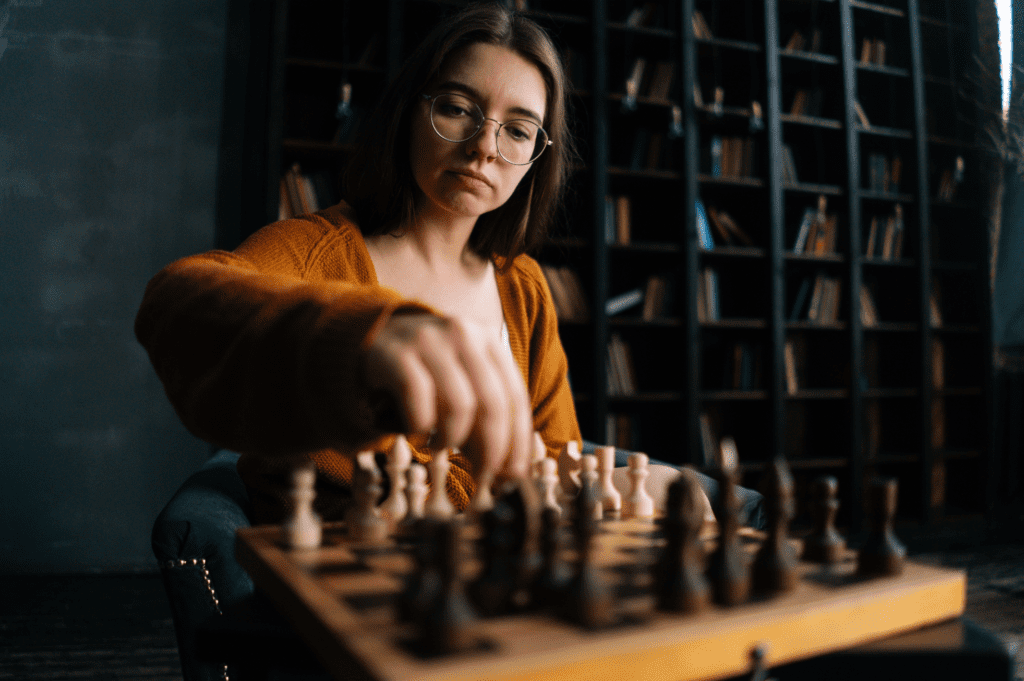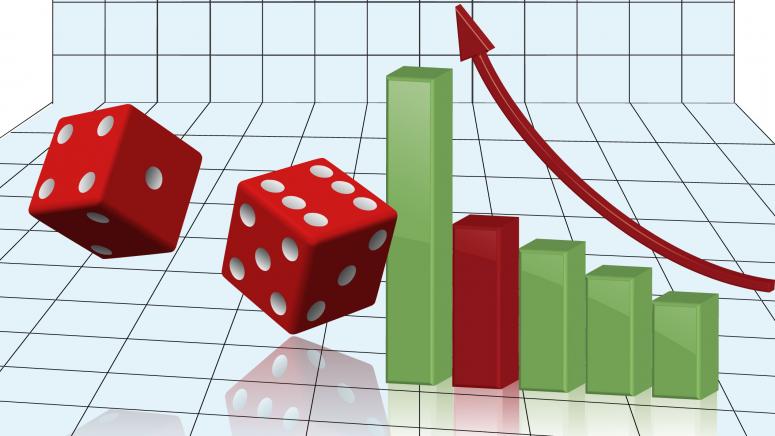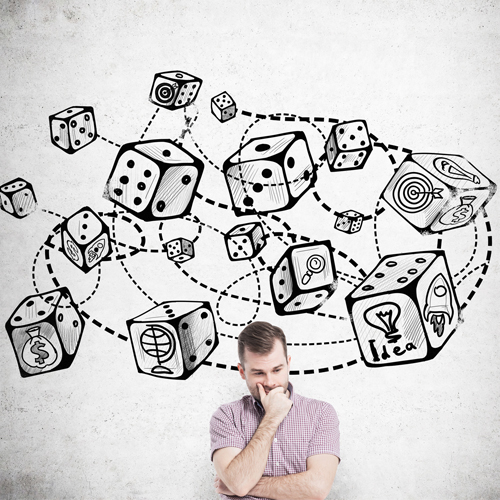
Life can seem random and chaotic and often doesn’t make sense to us. Applying the probability of success can help us better understand the world around us and make better decisions in our life and business. We can move from victim to master when we learn the art of turning the odds in our favor. Find out how the probability of success works and how to apply it to achieve your goals. (Estimated reading time: 11 minutes)
“Impossible odds set the stage for amazing miracles.”
— Jentezen Franklin
Things don’t always go our way. That’s a fundamental reality that all of us have to come to grips with. When faced with life’s dead ends, we’re told to accept and surrender to things we can’t change.
Even if there is an iota of hope, the odds are against us. A more sensible strategy is not going against it and walking away. But if you’re anything like me, part of you wonders if you can be an exception to the rule. A child-like part that wants to believe in the impossible.
There are plenty of people who defied the odds, like:
- Oprah Winfrey grew up in poverty and with few resources but became one of the wealthiest and most influential women in the U.S.
- Beethoven lost his hearing when he was at his creative peak but was still able to compose some of the most sublime pieces of music in the history of humankind.
- Malala Yousufzai survived being shot in the head by the Taliban and has become a global advocate for human rights, women’s rights and education.
These outliers prove that we don’t have to abandon our dreams.
There is an alternative to giving up and surrendering to fate. Instead of fighting the current, we can ride and flow with the tides. We do this by understanding the mechanics of probability and using that knowledge to maximize our chances.
But before figuring out how, let’s get a reality check. The road to success is not strewn with rose petals. Even if it is, we’ll have to deal with the thorns.
If you’re driven and want to do great things in life, you need to know what you’re up against. Here’s a taster:
- Almost 50 percent of all marriages in the United States will end in divorce or separation.
- Nearly 50 percent of businesses fail within five years
- The probability of achieving normal weight for an obese person is 1 in 210 for men and 1 in 124 for women.
I can go on and on, but I don’t want to dishearten you.
Also, privilege, personality traits, nationality, race, gender, connections, status, location, attractiveness, education, family background, and profession collectively play a pivotal role in determining your odds of winning the game of life – whatever that looks like to you.
A child born in the slums of a developing country has little to zero chances of getting an Ivy League education. Whereas an intelligent and well-educated kid born into a wealthy family can almost certainly get that trophy college degree.
The bottom line is that the game of life heavily favors some more than others. Is this fair? Not by any stretch. It’s incredibly discouraging and frustrating.
But we aren’t powerless. Instead of lamenting and dwelling on the unfairness we have to deal with, we can take matters into our own hands. You can create a winning hand no matter what cards you’ve been dealt in life.
We can make the best of our circumstances if we resist playing the victim and become a leader in our own lives and create our own rules.
You’ll need a winning mindset and the right tools to do this. One of the most effective ones is turning the odds in your favor by understanding the probability of success.
What is the probability theory

Life can seem random and chaotic and often doesn’t make sense to us. Given that we can’t always know how things will unfold, we need tools to boost our decision-making abilities. Probability helps us better understand the world around us and make better decisions in our life and business.
Probability is a mathematical term that speaks to the likelihood of something happening. Knowing an event’s probability allows us to predict an outcome. Having statistical data that will enable us to know our odds puts us in a better position to understand how likely they will become a reality.
With the help of mathematics and relevant history, we can maximize the probability of getting the desired outcome. If you need insight into the results of specific actions, you can look into the odds of other scenarios playing out and then psychologically prepare yourself.
Everything in the world (and the cosmos) can be predicted by probability. The simplest example of this is the coin flip which many of us learn in school. When we flip a coin, there are two possible outcomes: heads or tails. Some formulas can calculate the probability of a coin landing on heads, but we intuitively know that the likelihood is 50% or half/half.
It’s not so straightforward in other situations. But, we can make it easier to calculate the probability of success by using mathematical derivations like fractions and percentages. Once you know the likelihood of an event, you can classify it using this scale:
- It’s certain (100%) – The highest possible likelihood of something happening.
- It’s likely (50-100%)
- There’s an even chance (50%) – There’s a 50% chance it could go either way
- It’s unlikely (0-50%)
- It’s impossible (0%) – The probability is zero.
The four types of probability
Not all probability systems are created equally. Knowing the four different types of probability can help you choose the best one for your specific situation.
1. Classical probability: This is the most straightforward and basic approach to probability. For example, rolling a die, the only results you’ll get will range from one to six. Each time you roll the dice, you measure the results, not what happened, to calculate probability.
2. Experimental probability: This probability is calculated based on the number of trials you conduct. If you flip a coin, you have two possible outcomes: head or tails. But if you flip it 20 times and it lands on tails five times, your experimental probability is 5/20.
3. Theoretical probability: This analysis is based on the possible chances of something happening. For instance, if you want to know the theoretical probability of a dice landing on 4, you’ll have to find out the total number of outcomes that exist – which is 6 in this case.
There is a 1 in 6 chance you’ll land on a 4. Theoretical probability isn’t useful in real life because we can seldom predict all the possible outcomes in a given situation.
4. Subjective probability: When we’re under the influence of our biases and our reasoning, we predict outcomes based on subjective probability. It has no logical or formal explanation because it’s based on emotions and hunches.
For instance, if someone sees a higher chance of their favorite team winning, they feel a sense of affiliation with them, not because there is an analysis done on their past performances. Subjective probability can work if the person has had substantial experience in their field and backed it up with data. This is how veteran investor Warren Buffet predicts stock market trends.
Real life applications of probability

Probability is a helpful tool in many fields. Its application leads to smooth running processes and helps us avoid errors and even disasters. Here are some real-life examples of probability:
1. Weather forecasting: Before planning to go to the beach or the park, checking the weather forecast is part of our preparation. If forecasters say there is a 90% chance of rain today in the late afternoon, you know it is a high likelihood that it will rain during that time. Meteorologists develop these predictions after studying trends and using specific tools that give them this data.
2. Insurance: Insurance companies use probability to frame policies and rates. For example, health insurance for someone with a chronic illness will be more expensive than for someone in good health. It can also be helpful for a consumer. If you’re buying a car and choosing an insurance policy, you’ll need to consider how likely you are to file a claim. For instance, a second-hand vehicle used for a few years may need more repairs, so you’ll need to purchase a plan that will pay for them and minimize your out-of-pocket expenses.
3. Medical diagnosis: A doctor diagnosing a patient uses all types of mathematical techniques, including probability (in addition to their insights based on experience), in their daily practice so they can treat people efficiently. If someone comes in with a cold, they must evaluate whether the cough is due to an infection or something more serious. The ability to gauge probability is life-saving in this case.
4. Political election results: Many political forecasters use probability to predict specific candidates’ chances to win an election and their probability of success. As an election draws near, you’ll see pundits using historical data, trends, and polls to arrive at their predictions.
5. Sport and card games: Probability is used heavily by sports betting companies to predict which team has higher odds of winning a game. Stronger teams would have a higher probability of winning and offer a lesser payout to those who bet on them since they are highly likely to win. Coaches also use chance to assess where each team member is strong and what more needs to be done to win.
Probability is also used routinely by card players. Whether it’s poker, blackjack, board games or video games, players enhance their strategy by figuring out which person or team is more likely to win. Knowing this, they can bet and strategize accordingly to increase their odds of winning.
6. Dating: Love really is a numbers game. A study has shown that if you leave finding your love to fate, the odds are 1 in 562 on a given day. But singles can turn the odds in their favor by changing their location, attending more events, expanding their social network, and signing up for online dating sites. We can further increase it by enhancing our appearance and the pictures we use online and improving our dating and relationship skills.
The probability of success: how to turn the odds in your favor

We can move from victim to master when we learn the art of turning the odds in our favor. It may not get us what we want in the end, but it will certainly get us what we need – a sense of satisfaction that we gave it all and became a better person on the other side.
Here are four tips that can help increase your probability of success:
1. Develop the right mindset.
Everything begins with the mind. Our beliefs about ourselves, our capabilities, and what’s within our reach will impact how we approach our challenges. These are two essential aspects you want to incorporate into your thought process:
- Growth mindset: A growth mindset is rooted in curiosity and positive anticipation. A fixed mindset, on the other hand, is based on fear and a sense of lack. Developing a growth mindset will make you proactive and persistent about seeking knowledge and developing yourself. You’ll be able to thrive on challenges, view failure as part of the process, and use it as a catalyst for growth.
- Reality mindset: When we view things from a lens of reality, we see things for exactly what they are. When we do this, we’ll know what we’re up against – we don’t minimize the mountain we have to climb, nor do we blow it up to exaggerated proportions. Clarity and acknowledgment of the truth won’t demotivate us but will set us up for success.
2. Have the right game plan.
Creating the right game plan is essential if you want to win – but it’s significantly more important when the odds are not in your favor. A robust plan gives you a panoramic outlook on the feat you want to accomplish. A winning game plan that increases your probability of success should include:
- Comprehensive research of all the factors, people and circumstances involved.
- A forecast of potential scenarios and what you’ll do in each case.
- An exit strategy or a Plan B.
- An honest assessment of your abilities, skills, resources and time.
- An educational plan that ensures you stay informed and that your skills and knowledge on the topic remain at an expert level.
- A list of allies and supporters you can turn to in times of need.
- A reliable way to measure your progress.
- A self-care regime that keeps your energy levels and spirits high.
- A list of energy drainers, negative habits and beliefs you need to stay away from.
3. Be consistent.
Consistency is a secret ingredient that’s often missing when people are trying to beat the odds. They underestimate the power of being able to stick in the game long enough to see results from their efforts. It beats good luck, good intentions and talent because those who work every day are more likely to gain mastery and influence.
But being consistent is not easy, especially if you’re not seeing progress.
If you find yourself on the brink of giving up, think of people like Thomas Edison, who made 1000 unsuccessful attempts at inventing the light bulb, or J.K. Rowling, who was rejected by 12 publishing when she submitted the manuscript of Harry Potter and the Philosopher’s Stone.
4. Know when to pivot or cut your losses.
Sometimes while trying to beat the odds, we realize that what we’re after is not for us. Perhaps we recognize that pursuing it will require too big a sacrifice we’re unwilling to make. Or the goal we’re after is not as appealing as it used to be and therefore does not excite us. In such cases, we’re better off cutting our losses and choosing another path. We can either pivot or quit to increase our probability of success.
Pivoting is a less drastic change that keeps our winning odds intact. For example, pivoting in your career is when you leave your profession to join a parallel line of work that does not require new demonstrable skills. However, it will require you to use skills you already have and apply them in a new context.
The second option is to quit what you’re working on altogether. There is a sense of finality that requires you to wipe the slate clean and begin on a new quest. The key to doing this successfully is not to let it impact how you feel about yourself and make us feel like a failure.
Quitting is a quality control mechanism that helps us find the best options for our life. We’ll begin to feel more at ease with letting go of things. It will no longer affect our identity or self-worth.
Elon Musk once said that when something is important enough, you’ll do it even if the odds are not in your favor. Not only is his life a demonstration of this, but it shows the importance of being devoted. Devotion is heart-centered and is the most powerful way to make strides. Love is like the tailwind that will propel us toward our dreams.
All my best on your journey,
Seline

Question for you: Are you currently pursuing a path where the odds are stacked against you? If yes, what steps are you willing to commit to so that you can turn the odds in your favor and increase your probability of success?
Did you like this post? Sign up below, and I’ll send you more awesome posts like this every week.

Have Your Say